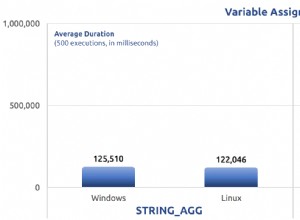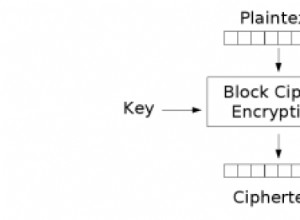Jeśli jakakolwiek indeksowana kolumna zawiera wartość inną niż null, wiersz zostanie zindeksowany. Jak widać w poniższym przykładzie, tylko jeden wiersz nie jest indeksowany i jest to wiersz, który ma NULL w obu indeksowanych kolumnach. Możesz również zobaczyć, że Oracle zdecydowanie indeksuje wiersz, gdy wiodąca kolumna indeksu ma wartość NULL.
SQL> create table big_table as
2 select object_id as pk_col
3 , object_name as col_1
4 , object_name as col_2
5 from all_objects
6 /
Table created.
SQL> select count(*) from big_table
2 /
COUNT(*)
----------
69238
SQL> insert into big_table values (9999990, null, null)
2 /
1 row created.
SQL> insert into big_table values (9999991, 'NEW COL 1', null)
2 /
1 row created.
SQL> insert into big_table values (9999992, null, 'NEW COL 2')
2 /
1 row created.
SQL> select count(*) from big_table
2 /
COUNT(*)
----------
69241
SQL> create index big_i on big_table(col_1, col_2)
2 /
Index created.
SQL> exec dbms_stats.gather_table_stats(user, 'BIG_TABLE', cascade=>TRUE)
PL/SQL procedure successfully completed.
SQL> select num_rows from user_indexes where index_name = 'BIG_I'
2 /
NUM_ROWS
----------
69240
SQL> set autotrace traceonly exp
SQL>
SQL> select pk_col from big_table
2 where col_1 = 'NEW COL 1'
3 /
Execution Plan
----------------------------------------------------------
Plan hash value: 1387873879
-----------------------------------------------------------------------------------------
| Id | Operation | Name | Rows | Bytes | Cost (%CPU)| Time |
-----------------------------------------------------------------------------------------
| 0 | SELECT STATEMENT | | 2 | 60 | 4 (0)| 00:00:01 |
| 1 | TABLE ACCESS BY INDEX ROWID| BIG_TABLE | 2 | 60 | 4 (0)| 00:00:01 |
|* 2 | INDEX RANGE SCAN | BIG_I | 2 | | 3 (0)| 00:00:01 |
-----------------------------------------------------------------------------------------
Predicate Information (identified by operation id):
---------------------------------------------------
2 - access("COL_1"='NEW COL 1')
SQL> select pk_col from big_table
2 where col_2 = 'NEW COL 2'
3 /
Execution Plan
----------------------------------------------------------
Plan hash value: 3993303771
-------------------------------------------------------------------------------
| Id | Operation | Name | Rows | Bytes | Cost (%CPU)| Time |
-------------------------------------------------------------------------------
| 0 | SELECT STATEMENT | | 2 | 60 | 176 (1)| 00:00:03 |
|* 1 | TABLE ACCESS FULL| BIG_TABLE | 2 | 60 | 176 (1)| 00:00:03 |
-------------------------------------------------------------------------------
Predicate Information (identified by operation id):
---------------------------------------------------
1 - filter("COL_2"='NEW COL 2')
SQL> select pk_col from big_table
2 where col_1 is null
3 and col_2 = 'NEW COL 2'
4 /
Execution Plan
----------------------------------------------------------
Plan hash value: 1387873879
-----------------------------------------------------------------------------------------
| Id | Operation | Name | Rows | Bytes | Cost (%CPU)| Time |
-----------------------------------------------------------------------------------------
| 0 | SELECT STATEMENT | | 1 | 53 | 4 (0)| 00:00:01 |
| 1 | TABLE ACCESS BY INDEX ROWID| BIG_TABLE | 1 | 53 | 4 (0)| 00:00:01 |
|* 2 | INDEX RANGE SCAN | BIG_I | 2 | | 3 (0)| 00:00:01 |
-----------------------------------------------------------------------------------------
Predicate Information (identified by operation id):
---------------------------------------------------
2 - access("COL_1" IS NULL AND "COL_2"='NEW COL 2')
filter("COL_2"='NEW COL 2')
SQL> select pk_col from big_table
2 where col_1 is null
3 and col_2 is null
4 /
Execution Plan
----------------------------------------------------------
Plan hash value: 3993303771
-------------------------------------------------------------------------------
| Id | Operation | Name | Rows | Bytes | Cost (%CPU)| Time |
-------------------------------------------------------------------------------
| 0 | SELECT STATEMENT | | 1 | 53 | 176 (1)| 00:00:03 |
|* 1 | TABLE ACCESS FULL| BIG_TABLE | 1 | 53 | 176 (1)| 00:00:03 |
-------------------------------------------------------------------------------
Predicate Information (identified by operation id):
---------------------------------------------------
1 - filter("COL_1" IS NULL AND "COL_2" IS NULL)
SQL>
Ten przykład działa na Oracle 11.1.0.6. Ale jestem przekonany, że dotyczy to wszystkich wersji.




